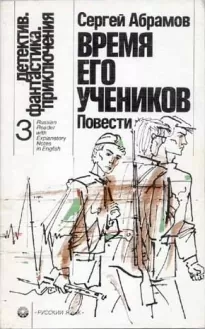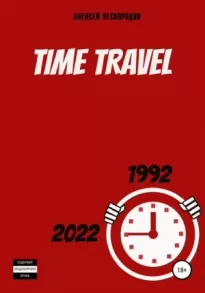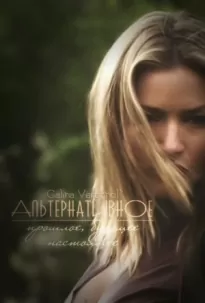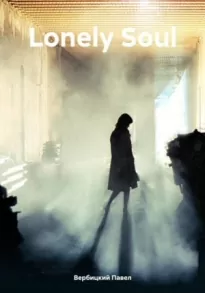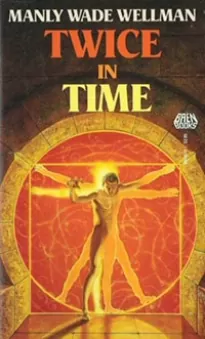Разговорный английский
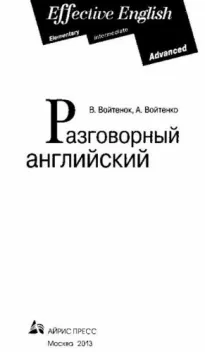
- Автор: Владимир Войтенок
- Жанр: Самиздат, сетевая литература
Читать книгу "Разговорный английский"
An extra dress is a perennial “Must”7 with women. The short evening dress is a much better buy than the long one for nine out of ten women, and it can look quite as glamorous. The lines that don’t date8 are the simple ones. Don’t exaggerate in padding your shoulders.
With colour you can be as daring as you like nowadays; colour combinations are also very much in favour now, but remember that a blue-eyed blonde would look uninteresting in pale blue because her eyes will be lost in the expanse of blue of her dress. Yellow, cardinal red and even black or white would suit her best. Blue is best on a dark-haired girl — especially royal blue.
Gloves. Now that nylon is within reach of everyone it is best to wear nylon gloves as they can be easily washed. Remember that spotless gloves — especially white — look undeniably smarter than even the very best suede gloves if these have grown dusty and shiny at the fingertips.
Your hats, too, should be immaculate; better none at all than a shabby-looking one. Flowers and feathers make an enchanting frame for a pretty face but only so long as they remain fresh. After that they have a messy appearance. When you set out to buy a new hat try, if possible, to wear the suit or dress that’s intended to partner it9. Don’t be content with a close-up look10 of yourself — walk up and down in front of a full-length mirror so that you see yourself from every angle — as other people will see you. Look at the hat in relation to your figure and (most important of all) your hair.
Accessories. Chic is more often lost through shoes and handbag than anything else. With many women elegance seems to stop at the knees. Nothing looks more incongruous than the sight of worn shoes emerging from beneath a lovely dress. You may like comfort, but it’s a pity to ally that beloved old pair of shoes of yours to your smartest suit. Unless you can afford a great many pairs of shoes, stick to the
simple classical type that never goes out of fashion and is so flattering to most feet. Avoid the shoddy shoe that is bound to lose its form immediately. Always try to team up1 11 a coat, skirt or dress with a plain but not “dressy” shoe.
A bag is both important and character-revealing. The effect of a beautiful dress will be spoiled by the wrong bag and still worse by an untidy or bulging bag. Never stuff your bag to capacity. A good bag need not be very expensive, but it should be well-cut and not fussy. Avoid unnecessary buckles, bows and all sorts of fancy work. The plainer the cut of your bag, the longer it will take you to tire of it. If you are plump don’t choose a round bag; it may be only a trick of the eye, but such a bag seems to add inches to your silhouette.
The final tip is that when you go to choose clothes — whether it is only a question of a new bag — go alone. If you take even your closest friend with you, you’ll probably end by buying what she likes instead of what you like. And it is positively fatal to take two or three friends. By the time you’ve listened to their conflicting opinions, you’ll have lost all confidence in your own judgement. And then when you get your purchase home, you will wonder what on earth made you decide on it!
If you need advice when you are buying clothes, rely on the saleswoman, who is an expert, and then choose whatever appeals to you. Remember that the clothes in which you feel happy are always the most successful clothes.
Remember that Enemy Number One both to chic and charm is untidiness. You can get away with a dress that is neither new nor expensive (if it is absolutely immaculate) but down-at-heel shoes, grubby-looking gloves, collar or cuffs, a creased skirt completely ruin the effect of a model dress no matter how expensive it may be.
Adapted from the “Everywoman ”
Vocabulary Notes
1 keynote — основной
2 to lead astray — сбиваться с пути 3 passing craze — преходящая мода
4 loose undatable style — свободный покрой, находящийся в моде длительное время
5 hairy fabrics — материал с ворсом
6 to divide the wear and tear — носить попеременно
7 perennial “Must” — вечная необходимость
8 don’t date — не выходят из моды
9 a dress that’s intended to partner it — платье, с которым предполагается носить шляпу
10 close-up look — взгляд (в зеркало) с близкого расстояния
11 to team up — объединять, подбирать
2. DRESSING
GEORGE. What! You are not dressed yet? We’ll be late, Tom. I’m sure.
TOM. No, we won’t. We have half an hour yet. Ma! Where are my socks?
MOTHER (coming in). You should know better where your socks are.
T. I mean the new socks that you —. Now, where is that tie, I wonder?
MOTHER. Aren’t you going to put on your new suit, Tommy?
T. Too much trouble.
G. I say, Tom, you just look at your tie — it’s all on one side.
T. What a nuisance this tie is. I’ll have to pin it, otherwise it won’t stay.
MOTHER. Tuck in your shirt; it’s almost half out. This is what it comes to when you don’t do things in time.
T. Well, Mother, what’s the use of arguing now. Couldn’t you possibly get me a clean handkerchief?
G. I say, Tom, are you really going to put on this coat?
T. Yes. What’s wrong with it?
G. You just look at yourself in the mirror and see what a fright you are.
T. Yes, it doesn’t quite match these trousers, but no time to change. Thank you, Mother. Well, George?
MOTHER. Tom your bootlace —.
T. I’ll lace it downstairs, Mother. Goodbye.
3. AT THE TAILOR’S
T. What can I do for you, sir?
С. I want to order a suit at your tailor’s, please.
T. Would you like to have it made of your own material?
C. No, I should like to see what you have.
T. What colour, sir?
C. Something in blue with a narrow white stripe, please.
T. Here is a piece lust the kind you want. It is fine, uncreasable, and it never fades.
C. Yes, I like it. Now, what have you of the latest designs?
T. Here is the magazine, sir. You may choose any fashion you like. How do you like this two buttons model suit?
C. Yes, it looks fine. I think I’ll choose this fashion.
T. With a waistcoat, sir?
C. No, without. I would like to have it lined with silk, please.
T. Yes, sir. Would you like to have your measure taken now?
C. Yes. How long will it take to have it ready?
T. About a week, sir.
C. Good. And when must I come to try it on?
T. In four days’ time, sir.
C. Must I pay now?
T. Yes, sir. Here is the receipt.
X. Everyday Services
1. AT THE BARBER’S
CUSTOMER. Good morning. Oh, you are engaged, I see.
BARBER. You’ll be attended to in a moment, sir. Won’t you sit down? There’s the today’s paper on the table, sir. CUSTOMER. Which is it?
BARBER. “The Times,” sir. {After a short time.) Please, sir. A cut and a shave?
CUSTOMER. Only a shave, please.
BARBER. Your hair wants cutting, sir.
CUSTOMER. Does it? Well, let’s have a haircut as well.
BARBER. Is it to be cut short?
CUSTOMER. By no means, I’m not a boxer, you know.
BARBER. But it’s more refreshing in a hot weather like this, sir. CUSTOMER. No, you won’t talk me into a crop. Just trim it all round and that’ll be the end of it.
BARBER. Yes, sir. {Begins cutting the customer's hair.) CUSTOMER. Your hairclipper pinches.
BARBER. Yes? I’ll change it, sir.
CUSTOMER. Now, see that no hair gets under my collar.
BARBER. Yes, sir. {After some time.) Do you find your hair cut as you like?
CUSTOMER. Well, that’ll be all right, I suppose. Now for a shave.
Finish the dialogue.
2. AT THE SHOEMAKER’S
CUSTOMER. I’d like to have these two pairs of shoes mended, please.
SHOEMAKER. Let me see them, please. This pair can be mended, but this pair is beyond repair.
C. Really? Why?
S. They have to be soled, but the soles won’t hold.
C. No?
S. No. The inner soles are no good, you see. Besides, they are out of shape altogether.
C. It’s a great pity. And these?
S. The heels will have to be tipped — they are worn down a great deal.
C. And what about the soles?
S. They’ll stand a good deal of wear yet. Now, this seam will have to be stitched.
C. Then there’s a little hole in the left shoe.
S. Yes, here it is. Well, that seems to be all, doesn’t it?
C. Yes, but do patch the hole neatly, please. Can you manage to put the patch from the inside?
S. Why, yes! I’ll glue it on, so that it won’t hurt your toe.
C. Well, and what will it come to all in all?
S. We’ll reckon it up now. ... roubles, please.
C. Must I pay in advance?
S. According to our regulations you must.
C. Well, here you are. When will you have them mended?
S. In two days’ time. Here is the receipt. Goodbye.
C. Goodbye.
3. PHOTOGRAPHY
This art has of late years become exceedingly popular among amateurs of both sex, and it is remarkable how many possess cameras, and how soon they acquire the art of using them with success. The camera is a useful and pleasant companion in our rambles, and by its means we can record many pleasant incidents which have occurred during a holiday, many pieces of beautiful scenery, and more especially the features of our friends and relatives.
Beginners must not be discouraged by a few early failures. Of course, it is impossible, in the space of an article of this kind, to explain the process of taking and developing a picture, and the only thing is to refer the reader to some of the very cheap and useful handbooks on the subject.
GEORGE. Hello, Tom! I say, what’s that?
TOM. Why, don’t you see? It’s a camera.
GEORGE. Let me have a look at it, will you? I’m a bit of a photographer myself.
TOM. Certainly. Well, how do you like it?
GEORGE. Yes, it seems to be an excellent thing. The opening1 (aperture) is 3.5 (three point five), and the lens is a very good one, too.
TOM. Yes, you just see how easy it is to focus this camera. Fine, isn’t it? It’s one of the latest models and has all the gadgets1 2.
GEORGE. Oh, you’ve got a stand to it too, I see. A nice stand, indeed. I like these stands of the telescope type — they are very easy to unfold and fold (shut), you know.
TOM. Yes, and see what exposures you can give — up to 1/500 (one five hundredth) of a second.
GEORGE. What sort of films can be used?
TOM. With my old camera I used to use plates, but with this one you can use plates, filmpacks3 or roll-films4, whichever you like.
GEORGE. Which do you like best, roll-films or filmpacks?
TOM. Well, I use both kinds. Roll-films are, of course, much more convenient, especially when you are outing.
GEORGE. But you know what I do, Tom. I buy roll-films, cut them and fit them into the slides5, just like plates. It comes out a great deal cheaper, you know.
TOM. That sounds a good tip. I will try them once.
Vocabulary Notes
1 opening (aperture) — диафрагма
2 gadget — приспособление
3 filmpack — пленки в пачке
4 roll-film — катушечная пленка
5 slide — кассета
4. LAUNDRY
MAID. Did you send for me, sir?
MR. A. Yes. I would like to have my things washed. How can that be done?
MAID. I shall send the laundress, sir. Is there anything else you would like?
MR. A. A bath, please. Is it free of charge?
MAID. No, sir. You have to pay extra for the bath. Shall I make it ready now?
MR. A. No. In an hour’s time, please. And now send the laundress.
MAID. Directly, sir.
LAUNDRESS. What can I do for you, sir?
MR. A. Have these things washed, please.
LAUNDRESS. Have you made a list, sir?
MR. A. Yes, here it is. Check it, please.
LAUNDRESS. Yes, sir.
MR. A. This suit has to be dry-cleaned. Mind there is a spot on the trousers. Have it removed, please.
LAUNDRESS. Yes, sir.
MR. A. Have you got an express service here? LAUNDRESS. Yes, sir, but you will be charged extra in that case.
MR. A. It doesn’t matter. I should like to have them ready by tomorrow.
LAUNDRESS. Yes, sir. Is that all?
MR. A. Yes. Don’t disappoint me. LAUNDRESS. Rest assured, sir. Goodbye.
XL Rest and Recreation
1. THEATRE
After a Visit to the Theatre
MOTHER. Did you enjoy yourself, Ann?
ANN. Oh, yes, mama. The opera was splendid, especially the music. I was so deeply impressed by it that I can hardly put into words what I think of it.
MOTHER. And who’s the composer, I can’t quite recollect?
ANN. Verdi, Guiseppe Verdi, mama. His music expresses such deep humanity that it simply carries one away.
MOTHER. If I am not mistaken, the music for “Aida” was also written by him?
ANN. Yes, but in “Othello” the music is much richer. There is power and delicacy and marvellous beauty in it. The voice parts are essentially melodious. Indeed this work is a monument of genius.
MOTHER. And was the rendering good?
ANN. Oh, yes, the cast was excellent except —.
MOTHER. Except whom?
ANN. Well, I didn’t altogether like — now, what’s her name I can’t remember. Oh, yes, Vera M.
MOTHER. Vera M.? I’ve never heard of her before. What was her part?
ANN. She played Desdemona. I think she falls short in her Desdemona.
MOTHER. What makes you think so?
ANN. Well, there was a sort of lack of feeling in her acting; she had such a feeble voice that she was hardly heard.
MOTHER. Who performed the role of Othello?
ANN. Victor N. He gives a very convincing and moving performance as Othello, I should say.
MOTHER. Oh, yes, N.’s acting is generally praised.
ANN. Yes. His play is so natural that one begins to feel for him as in real life.
MOTHER. They had a full house, I suppose?
ANN. Up to the very doors. You should go with Daddy to hear it, mama. I know you’ll enjoy it.
MOTHER. I think we should. It’s a long time since I was at the theatre ...
2. CINEMA
a) Realist Tradition
The Eisenstein tradition is acknowledged the world over as one of the greatest in film making. It is actually felt in almost all the works of present-day film producers, many of whom studied under Eisenstein.
Producers like Gerasimov, Alexandrov, Yutkevich, Pyryev and others are the custodians of this tradition of realism.
The first prize-winning film at the first Moscow festival, “And Quiet Flows the Don”, based on Mikhail Sholokhov’s famous novel, is a striking example of this tradition.
It was produced by S. Gerasimov, who was awarded the festival’s first prize for personal work.
The Soviet producers in selecting their stars for a film make it a point of looking for people who are really like their literary prototypes, not only in external appearance, but inwardly, spiritually.
In choosing the actors for “And Quiet Flows the Don” great importance was attached to the ability to abandon theatrical convention and to act in, what cinema people call, the actual setting — to live on horseback, to master the cossack’s way of speaking, mannerisms, his humour.
Almost all the work on the film was done in the Don country in the actual setting described in the novel, with the cooperation of the local Cossacks, and the result has been to bring the very breath of the Cossack country to the screen, with the breathtaking beauty of the open-air scenes and the sunsests on the steppes.
The film “The Idiot”, which is a screen version of Dostoevsky’s novel under the same title, may serve as another example of this tradition of realism.
All his life Dostoevsky felt a keen concern at the fate of men humiliated by the power of money, and this feeling emerges in all his works, including the novel “The Idiot”. That is why Pyryev, the producer of the film, in his approach to the novel took up as the principal theme the task of disclosing the shameful power of money over the human soul. Thus the story and the idea of the novel have been correctly interpreted and the leading characters represented without distortion.
b) Going to the Cinema
K. Have you been to a cinema lately?
M. Well, let me think. Oh, yes, I saw “ ” weeks ago.
К. I haven’t seen it. Is it any good?
M. I really couldn’t say it was up to much. The plot is so much tangled up that I couldn’t make out who’s who in the picture.
K. Wouldn’t you like to see something now?
M. I’d love to, but a really nice picture. Is there anything decent on anywhere?
К. I was told that “ ” is a very nice film.
M. Is it of our production?
K. No, it’s an English talkie dubbed in Russian.
M. It’s a pity that it is dubbed. I like to hear the English language, you know. Just for the sake of practice.
K. So do I. Would you care to see that film?
M. All right. Where is it going on?
K. They have it at the Hermitage. Would you like to go there?
M. I should indeed.
(At the cinema.)
M. Now, would you believe it! We’ll have to queue for the tickets.
K. I’ll jump it.
M. In no case. You forget that you are with a lady, and besides, isn’t it a shame to ... jump a queue?
К. I beg your pardon. I was anxious to get tickets for the next show, you know.
M. Why, wouldn’t we be able to get them?
K. Not for the next. They are letting out now.
